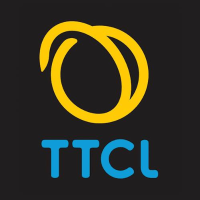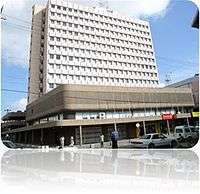Tanzania Telecommunications Company Limited
 Generation T. Solved Logo | |
| Industry | Communications Services |
|---|---|
| Founded | 1993 (commenced operations on 1 January 1994 ) |
| Headquarters | Dar Es Salaam, Tanzania |
Area served | Tanzania |
Key people | Dr. Kamugisha Kazaura, CEO |
| Products | TTCL Broad band, TTCL Mobile, IP VPN, Prepaid Services, Postpaid Services, Rafiki Public Phone, Leased Circuits, Internet Bandwidth, Broadband and Wholesale Administrator |
| Revenue |
|
|
| |
| Owner | Tanzanian Government (100%) |
Number of employees | 1,600 (Feb 2016) |
| Website |
www |
Tanzania Telecommunications Company Limited (TTCL) is the oldest and largest fixed line telecommunications company in Tanzania. The company comes forth from the former Tanzania Posts and Telecommunications Corporation in 1993. TTCL was wholly owned by the Government of Tanzania until the partial privatization of the company on February 23, 2001.
TTCL is governed by statute—the Tanzania Telecommunications Act of 1993. The company is licensee for fixed basic telephone services in Tanzania mainland and Zanzibar and hence it owns and operates the public switched telephone network in mainland Tanzania and on Zanzibar.[2] Before the coming of mobile operators in late 1994, the company was enjoying monopoly on Tanzania Mainland and a duopoly on Tanzania Zanzibar, where Zanzibar Telecoms Limited (Zantel) was the second licensed fixed basic telephony operator. The company has been in several joint managements due to its financial instability in the past and has gone through several restructuring phases.
It has been working with Huawei Technologies Co. Ltd as the infrastructure vendor of the company and Ericsson as a long-term strategic supplier of the company.[3]
History
Early history
TTCL traces its roots to the East African telecommunications provider. In 1933, the former East African Post and Telegraph Company covered Postal, Telegraph and Telephone services in the three East African nations of Tanganyika, Kenya and Uganda. In 1951 the British government replaced the East African Post and Telegraph Company and enacted the The East African Posts and Telecommunication Act in 1951 to charter the East African Posts and Telecommunications Administration.[4]
In 1967, post independence of the three nations, the East African Community (EAC) was founded and replaced the East African Common Service Organization. In the aftermath, the East African Post and Telecommunications Corporation (EAP&TC) was established and replaced the East African Posts and Telecommunications Administration. However, ten years later, the breaking up of EAC in 1977 forced EAC member countries to re-establish their own national Postal, Telegraph and Telephone businesses. Therefore, in 1978 in Tanzania a parastatal was established under the name Tanzania Posts and Telecommunications Corporation (TPTC).[5]
In 1993 when the government of Tanzania heavily restructured parastatals, the Telecommunication sector was liberalized. This saw the splitting up of the TPTC; the TPTC split into three separate entities, namely the Tanzania Posts Corporation, the Tanzania Telecommunications Company Limited (TTCL), and the Tanzania Communication Commission (TCC).
Partial privatization
With increased domestic competition and poor management the government decided to privatize the company. The partial privatization of TTCL began on February 23, 2001, with Celtel International (previously known as MSI Cellular) headquartered in Amsterdam, Netherlands, together with the German firm Detecon, obtained 35% shares from the Government of Tanzania. The consortium took over Board and Management control of TTCL, and 23 February 2001 onward, had a veto over major Board of directors decisions, right to appoint the senior management, to set the annual business plan and to control all capital expenditure decisions.[6] In August 2005, TTCL pulled out from joint management and the Government of Tanzania and Celtel International signed an agreement whereby the shareholders agreed to the restructuring of the two companies and thereafter the TTCL and the Celtel became legally, financially and operationally totally separate companies.[7]
Sasktel
The government faced similar issues with the company due to lack of capital and in 2 years in February 2007 the Government of Tanzania awarded a Canadian firm SaskTel a three-year contract to manage TTCL. The contract required the new management team to improve the financial position of TTCL and grow its customer and revenue sources. SaskTel International started to manage TTCL from July 1, 2007. However, SaskTel was not able to turn the fortunes of the company around and in May 2009, SaskTel submitted a 45-day notice on 12 July 2009, outlining its intention to pull out of the contract.[8]
Transfer of shares
On September 2007 Celtel's Parent Company MTC Group was acquired by Zain International BV of Kuwait.[9] Along with the celtel brand, Zain also acquired the 35% share in TTCL. From the 2005 agreement Celtel and TTCL were considered separate legal entities and therefore, Zain had no direct control over the companies operations. Similarly on June 8, 2010, Bharti Airtel struck a deal to purchase of mobile operations in 15 African countries from Zain and inherited the stake.[10]
Nationalization
In February 2016, Bharti Airtel owner of 35 percent stake in the state telecom company agreed to sell its shares back to the government for 14bn/-. The dispute between the company and the government lasted for three years as the company demanded more money in compensation.[11] However, the sale was concluded on 23 June 2016 and the company returned to being entirely state owned.[12]
Corporate affairs

Ownership
Currently the company is wholly owned by the Government. In 2001 the government of Tanzania sold 35% stake in the company and in 2016 to protect the firm, repurchased the stock to regain 100 percent ownership. The last partners of the company were Bharti Airtel of India.[13]
Business trends
As of March 2016 TTCL has the smallest subscriber base than the top six mobile phone operators in the country. TTCL maintains a total subscriber base of 305,000 of which 45 percent have fixed phone lines. In the fixed line market, TTCL almost has a monopoly and handles over 99 percent of the subscribers.[14]
| 2010 | 2011 | 2012 | 2013 | 2014 | 2015 | |
|---|---|---|---|---|---|---|
| Turnover (TZS bn) | 80 | 93 | ||||
| Turnover (US$ m) | 57.5 | 55.1 | ||||
| Net profit/loss (TZS bn) | -28 | -16 | ||||
| Subscribers | 252,813 | 226,153 | 227,424 | 209,111 | 288,136 | 303,186 |
| Notes/sources | [11] | [15] | [16] | [11][17] | [18] | [19] |
Headquarters
The company has its headquarters and customer care allocated in Extelecom's Building in Dar Es Salaam, Tanzania. TTCL also manages and operates offices and an engineering department in all regions and major towns in the country.
Other telecom companies In Tanzania
| Network Operator | Any Fixed line/Cable service? | Technology Deployed | Any Plan for Wimax? | Company strategies |
|---|---|---|---|---|
| TTCL | Yes - copper Cables; leased lines; basic POTS; ADSL; SDSL. | Mobile & Fixed Wireless: CDMA2000(3G) Coverage area: At first major cities, later to cover the whole country | Yes | Major strategy: voice access and backbone provision. National and international calling; Internet access, International gateway license; video on demand in the future? |
| Airtel Tanzania | No | GSM 900/1800; Deployed 3G | Not indicated | Mainly voice; |
| MIC Tanzania Limited (tiGO) | No | GSM 900/1800, Deployed 3G in Major Cities | Yes, currently doing initial steps – no frequency application yet | Mainly voice |
| Vodacom Tanzania | No | GSM 900/1800, Deployed 3G | Yes – spectrum guaranteed by regulator for 3.5 GHz. Targeting data transfer for corporate sector - major cites | Basic voice services; data transfer |
| ZANTEL | No | Deployed Hybrid, currently on steps to rollout 3G, currently 3G only in Zanzibar and Dar es salaam | Yes | Voice; access to the international gateway |
See also
- Vodacom Tanzania
- Celtel Tanzania
- MIC Tanzania Limited (tiGO)
- Vodacom
- 3G Technology
- Celtel International
- Celtel Africa Challenge
- Eastern Africa Submarine Cable System
References
- 1 2 Majaliwa. "Govt Reclaims 100 Percent Shares in TTCL Ownership". AllAfrica. Retrieved 7 September 2016.
- ↑ the divestiture of the TTCL
- ↑ Tanzania’s leading operator TTCL, enters the next generation with an Ericsson ‘Learning Solution
- ↑ B., Smith, Allan (1971-01-01). "History of the east African posts and telecommunications administration 1837 to 1967".
- ↑ "The Tanzania Posts and Telecommunications corporation Act, 1977" (PDF). Government of Tanzania. Retrieved 6 September 2016.
- ↑ The Regulatory Design Problem Revisited: Tanzania’s Pioneering Position in Africa
- ↑ TTCL and Celtel now separate companies 22 August 2005
- ↑ TGC, . (6 July 2009). "SaskTel Pulls Out of TTCL Deal". Telegeography.com. Retrieved 28 May 2015.
- ↑ "Zain - about-us - milestones". Zain Group. Retrieved 2015-08-06.
- ↑ Tripathy, Devidutta; Goma, Eman (8 June 2010). "Bharti closes $9 billion Zain Africa deal". Reuters. Reuters. Retrieved 7 September 2014.
- 1 2 3 "Tanzania: Govt Reclaims 100 Percent Shares in TTCL Ownership". Retrieved 2016-09-07.
- ↑ Reporter, DAILY NEWS. "State in full ownership of TTCL". dailynews.co.tz. Retrieved 2016-09-07.
- ↑ "Tanzanian government takes back 35% of TTCL from Airtel to regain full ownership". 2015-05-27. Retrieved 2016-09-06.
- ↑ "March 2016 communication statistics" (PDF). tcra.co.tz. March 2016.
- ↑ "TCRA Statistics 2011" (PDF).
- ↑ "TCRA Statistics 2012" (PDF).
- ↑ "TCRA Statistics 2013" (PDF).
- ↑ "TCRA Statistics 2014" (PDF).
- ↑ "TCRA statistics 2015" (PDF).